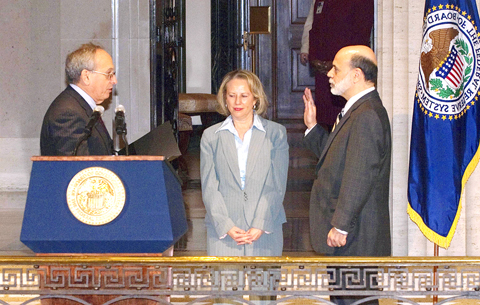US Federal Reserve Chairman Ben Bernanke vowed to defend the independence of the central bank, work harder to explain its decisions to the public and step up supervision of the nation’s banks during his second term.
“In the interest of maintaining public confidence and promoting economic and financial stability, we must continue to protect our independence,” the 56-year-old former Princeton University professor told Fed employees assembled in the atrium of the central bank’s Washington headquarters after he was sworn in for another four-year term yesterday.
Bernanke was confirmed last month by a Senate vote of 70 to 30, the most opposition since the chamber started voting on Fed chiefs in 1978. Lawmakers are considering legislation to remove a shield from congressional audits of monetary policy and to strip the Fed of bank-supervision powers, measures that Bernanke opposes.

PHOTO: REUTERS
Bernanke said independence is worth defending because it allows the central bank to make monetary policy “in the longer term economic interests of the American people, rather than in the service of short-term political imperatives.”
At the same time, that autonomy “brings with it fundamental obligations of transparency, responsiveness and accountability.”
He said the bank would seek to increase the already “voluminous” information it makes public.
“We will continue work with the Congress to ensure maximum transparency of America’s central bank, without compromising our ability to conduct policy in the public interest,” he said, according to a text of his speech provided by the Fed.
The House in December voted to approve a proposal by Representative Ron Paul, a Republican from Texas, to open the Fed’s interest-rate decisions to audits by congressional investigators.
The Fed chairman said the central bank must also revise its approach to banking supervision in light of the lessons of the most severe financial crisis since the 1930s, which prompted the central bank to participate in rescues of firms including New York-based insurer American International Group Inc and Citigroup Inc.
“The crisis revealed weaknesses and gaps in the regulation and supervision of financial institutions and financial markets,” Bernanke said. “We must continue to do all that can be done to ensure that our economy is never again devastated by a financial collapse.”
In the Senate, Banking Committee Chairman Christopher Dodd, a Connecticut Democrat, is proposing a measure to strip the Fed and other agencies of banking-supervision authority and to consolidate that power in a single new regulator. Dodd has called the Fed’s oversight record leading up to the crisis “abysmal.”
During his second term, Bernanke will also have to begin reversing a record monetary expansion without undercutting the recovery from the recession. While the economy grew at the fastest pace in six years in the fourth quarter, economists project the unemployment rate will average 10 percent this year.

MORE VISITORS: The Tourism Administration said that it is seeing positive prospects in its efforts to expand the tourism market in North America and Europe Taiwan has been ranked as the cheapest place in the world to travel to this year, based on a list recommended by NerdWallet. The San Francisco-based personal finance company said that Taiwan topped the list of 16 nations it chose for budget travelers because US tourists do not need visas and travelers can easily have a good meal for less than US$10. A bus ride in Taipei costs just under US$0.50, while subway rides start at US$0.60, the firm said, adding that public transportation in Taiwan is easy to navigate. The firm also called Taiwan a “food lover’s paradise,” citing inexpensive breakfast stalls

TRADE: A mandatory declaration of origin for manufactured goods bound for the US is to take effect on May 7 to block China from exploiting Taiwan’s trade channels All products manufactured in Taiwan and exported to the US must include a signed declaration of origin starting on May 7, the Bureau of Foreign Trade announced yesterday. US President Donald Trump on April 2 imposed a 32 percent tariff on imports from Taiwan, but one week later announced a 90-day pause on its implementation. However, a universal 10 percent tariff was immediately applied to most imports from around the world. On April 12, the Trump administration further exempted computers, smartphones and semiconductors from the new tariffs. In response, President William Lai’s (賴清德) administration has introduced a series of countermeasures to support affected

CROSS-STRAIT: The vast majority of Taiwanese support maintaining the ‘status quo,’ while concern is rising about Beijing’s influence operations More than eight out of 10 Taiwanese reject Beijing’s “one country, two systems” framework for cross-strait relations, according to a survey released by the Mainland Affairs Council (MAC) on Thursday. The MAC’s latest quarterly survey found that 84.4 percent of respondents opposed Beijing’s “one country, two systems” formula for handling cross-strait relations — a figure consistent with past polling. Over the past three years, opposition to the framework has remained high, ranging from a low of 83.6 percent in April 2023 to a peak of 89.6 percent in April last year. In the most recent poll, 82.5 percent also rejected China’s

PLUGGING HOLES: The amendments would bring the legislation in line with systems found in other countries such as Japan and the US, Legislator Chen Kuan-ting said Democratic Progressive Party (DPP) Legislator Chen Kuan-ting (陳冠廷) has proposed amending national security legislation amid a spate of espionage cases. Potential gaps in security vetting procedures for personnel with access to sensitive information prompted him to propose the amendments, which would introduce changes to Article 14 of the Classified National Security Information Protection Act (國家機密保護法), Chen said yesterday. The proposal, which aims to enhance interagency vetting procedures and reduce the risk of classified information leaks, would establish a comprehensive security clearance system in Taiwan, he said. The amendment would require character and loyalty checks for civil servants and intelligence personnel prior to